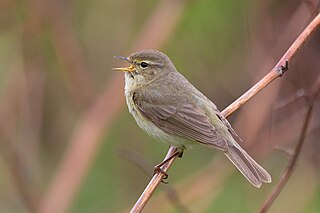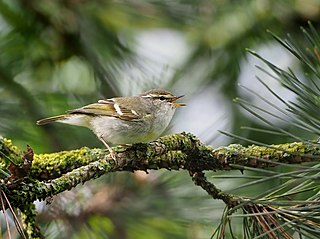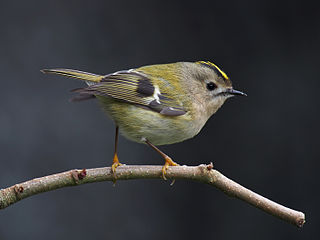
Leaf warblers are small insectivorous passerine birds belonging to the genus Phylloscopus.

The common chiffchaff, or simply the chiffchaff, is a common and widespread leaf warbler which breeds in open woodlands throughout northern and temperate Europe and the Palearctic.

The Iberian chiffchaff is a species of leaf warbler endemic to Portugal, Spain and North Africa, west of a line stretching roughly from the western Pyrenees via the mountains of central Spain to the Atlantic.

The mountain chiffchaff or eastern chiffchaff is a species of leaf warbler found in the Caucasus and Himalayas, and is an altitudinal migrant, moving to lower levels in winter. The nominate subspecies is similar to the Siberian chiffchaff, but with a finer darker bill, browner upperparts and buff flanks; its song is almost identical to the common chiffchaff, but the call is a weak psew. P. s. lorenzii is warmer and darker brown than the nominate race; it is sympatric with common chiffchaff in a small area in the Western Caucasus, but interbreeding occurs rarely, if ever. The mountain chiffchaff differs from tristis in vocalisations, external morphology and mtDNA sequences. Its two subspecies appear to be distinct vocally, and also show some difference in mtDNA sequences.

Siberian chiffchaff is a leaf-warbler which is usually considered a subspecies of the common chiffchaff, but may be a species in its own right.

Tree warblers are medium-sized warblers in the marsh- and tree-warbler family Acrocephalidae. They are found in Europe, Africa and western Asia. Until recently, they were all classified in the single genus Hippolais.

The yellow-browed warbler is a leaf warbler which breeds in the east Palearctic. This warbler is strongly migratory and winters mainly in tropical South Asia and South-east Asia, but also in small numbers in western Europe. Like the rest of Phylloscopidae, it was formerly included in the Old World warbler assemblage.

The goldcrest is a very small passerine bird in the kinglet family. Its colourful golden crest feathers, as well as being called the "king of the birds" in European folklore, gives rise to its English and scientific names. The scientific name, R. regulus, means 'petty king' or prince. Several subspecies are recognised across the very large distribution range that includes much of the Palearctic and the islands of Macaronesia and Iceland. Birds from the north and east of its breeding range migrate to winter further south.

Hume's leaf warbler or Hume's warbler is a small leaf warbler which breeds in the mountains of inner Asia. This warbler is migratory and winters mainly in India.

The western Bonelli's warbler is a warbler in the leaf warbler genus Phylloscopus. It was formerly regarded as the western subspecies of a wider "Bonelli's warbler" species, but as a result of modern taxonomic developments, they are now usually considered to be two species:

The Eastern Bonelli's warbler, sometimes known as Balkan warbler, is a "warbler" in the leaf warbler genus Phylloscopus. It was formerly regarded as the eastern subspecies of a wider "Bonelli's warbler" species, but as a result of modern taxonomic developments, they are now usually considered to be two species:

The Madeira firecrest, Madeira kinglet, or Madeiracrest is a very small passerine bird endemic to the island of Madeira. It is a member of the kinglet family. Before it was recognised as a separate species in 2003, it was classified as a subspecies of the common firecrest. It differs in appearance and vocalisations from its relative, and genetic analysis has confirmed it as a different species. The Madeiran bird has green upperparts, whitish underparts and two white wingbars, and a distinctive head pattern with a black eye stripe, short white supercilium, and a crest that is mainly orange in the male and yellow in the female.

The eastern Canary Islands chiffchaff or Lanzarote Island chiffchaff is an extinct subspecies of the Canary Islands chiffchaff endemic to the island of Lanzarote – and possibly also Fuerteventura – in the Canary Islands, Spain.

The Canary Islands chiffchaff is a species of leaf warbler endemic to the Canary Islands, Spain. Sometimes the English name is spelled Canary Island chiffchaff.

The Corsican finch, also known as the Corsican citril finch or Mediterranean citril finch, is a bird in the true finch family, Fringillidae.

The Barolo shearwater, also known as the North Atlantic little shearwater or Macaronesian shearwater, is a small shearwater which breeds in the Azores and Canaries of Macaronesia in the North Atlantic Ocean. The English name and the specific baroli refers to Carlo Tencredi Falletti, marquis of Barolo.

Canarina is a genus of flowering plants within the family Campanulaceae. They are herbaceous perennial vines with bell-shaped flowers. The best known species is Canarina canariensis from the laurel forests of the Canary Islands which is grown as an ornamental plant. C. canariensis is one of a group of unrelated Canarian plants that appear to be adapted for bird pollination, including the members of the genera Isoplexis and Lotus. It was once thought that the original pollinators of these plants were sunbirds which had become extinct on the Canary Islands, explaining why some of these species are rare and considered endangered. However more recent work has shown that these plants are adequately pollinated by non-specialist flower visiting birds, particularly the Canary Islands chiffchaff and the Canary Island spectacled warbler, and in fact show some specific adaptations to infrequent pollination by these birds, such as extended flower lifespans, and a hexose-dominated sugar ratio of the nectar.

The genus Hieraaetus, sometimes known as small eagles or hawk-eagles, denotes a group of smallish eagles usually placed in the accipitrid subfamilies Buteoninae or Aquilinae.
There are four species of bird named chiffchaff:
Johann Polatzek was an Austrian army captain and collector of natural history specimens. He collected birds and insects from the Canary Islands and the Gran Canary finch was described from his collections by Ernst Hartert.


















